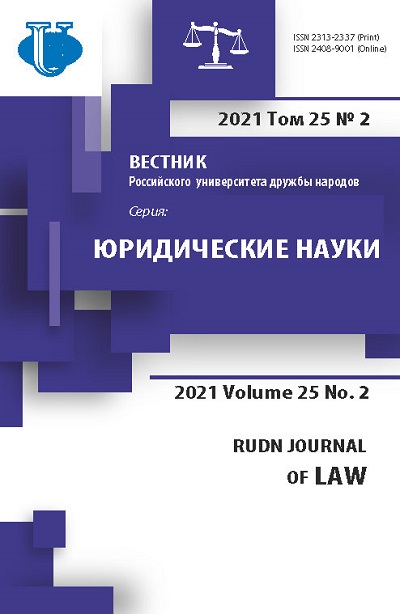Dispositivity principle in the criminal procedure of Azerbaijan Republic: concept and application in individual rights
- Authors: Jafarov G.V.1
-
Affiliations:
- Baku State University
- Issue: Vol 25, No 2 (2021)
- Pages: 504-520
- Section: PROCEDURAL LAW. PROSECUTOR SUPERVISION
- URL: https://journals.rudn.ru/law/article/view/26711
- DOI: https://doi.org/10.22363/2313-2337-2021-25-2-504-520
- ID: 26711
Cite item
Full Text
Abstract
Unlike other principles of criminal procedure (such as legality, presumption of innocence, etc.), the principle of dispositivity (the principle of autonomy of the will of a participant in the proceedings) does not have an independent legal formula, enshrined in a separate article in the current criminal procedure legislation of Azerbaijan. In this regard, questions about the existence, concept, content, individual elements, manifestations, and scope of the principle are becoming relevant and at the same time highly disputable. The author aims to determine the essence of dispositivity, to consider its individual manifestations, as well as to develop scientifically sound recommendations for optimizing the application in practice of the norms of the Code of Criminal Procedure in regulating issues related to the dispositive basis of the criminal process. The set goals predetermined solution for such basic issues as study of the philosophical and legal concept of dispositivity; determination of determinants-manifestations of dispositivity in criminal proceedings as a whole; recognition of dispositivity as one of the autonomous principles of the modern criminal process of Azerbaijan. The study was conducted by methods of dialectical cognition based on the principles of reflection, comprehensiveness, unity of induction and deduction, determinism, contradiction, and unity of analysis and synthesis. The author has studied and summarized a great deal of doctrinal material and jurisprudence, and some selected judicial acts have been used as real models for casuistry of the issues addressed in the article. As a result of the study, the author substantiates that, despite the absence of an independent article in the CPC on this principle, dispositivity is an autonomous principle of criminal procedure, not covered by other principles; on the contrary, it enters into various correlative relations with them. In other words, the Code of Criminal Procedure does not provide a binding feature of the principle of criminal procedure. As the main determinants of the principle under study, the author proposes to consider a system of procedural rights of non-governmental participants in the proceedings that have the effect of initiating some kind of proceedings, and the “consent of a participant” category, which is a mandatory condition in the procedural decision-making mechanism of entities with power.
About the authors
Gahraman V. Jafarov
Baku State University
Author for correspondence.
Email: qehraman79@mail.ru
Doctor of Philosophy in Law, Associate Professor of the Department of Criminal Procedure
23 Academic Zahid Khalilov str., Baku, AZ 1148, Azerbaijan RepublicReferences
- Abbasova, F.M. (2015) Criminal procedure. General part. Coursebook. Revised 2nd edition. Baku, Zerdabi Publ. (in Azerbaijan).
- Abbasova, F.M. (2018) Special operations in criminal procedure. Handbook. Baku, Ecoprint Publ. (in Azerbaijan).
- Abbasova, F.M. (2019) Criminal procedure. Special part. Coursebook. Revised 3rd edition. Baku, Hugug Yayin Evi Publ. (in Azerbaijan).
- Abdullayev, F.S. (2018) The Legal Positions of the Constitutional Court of Azerbaijan. New edition. T. 1. Baku. (in Azerbaijan).
- Adamaytis, M. (2003) The consent of the parties is not identical to the consent of one party. Russian Justitia. (2), 30-31. (in Russian).
- Bayramova, K. (2019) On the right of the acquitted person to appeal to higher courts. Ganun journal. 7 (297), 72-77. (in Azerbaijan).
- Cahangirova, Ş. (2019) Issues of reconsideration of court verdicts and other final decisions in criminal proceedings. Forensic Examination, Criminology and Criminology Issues. (67), 105-108. (in Azerbaijan).
- Golubov, I.I. (2016) To the question of the advantage of an inquiry over a private prosecution. Russian Judge. (5), 27-33. (in Russian).
- Golubov, I.I. (2016) On the need to abolish the private prosecution. Magistrate judge. (5), 33-40. (in Russian).
- Dvoretskova, D.A. (2012) Challenges in expanding the scope of private prosecution cases. Bulletin of the Russian Law Academy. (2), 44-48. (in Russian).
- Dikarev, I.S. (2008) The principle of dispositivity in the criminal process of Russia. Journal of Russian Law. (6), 73-78. (in Russian).
- Ehmedov, V.E. (2011) Theoretical and Practical Issues of Procedural Control at Stage of Preliminary Investigation. Synopsis of the dissertation submitted for the degree of Doctor of Philosophy in Law. Azerbaijan, Baku. (in Azerbaijan).
- Haydarov, A.A. (2016) On the concept of “onsent” in the criminal process of Russia. Journal of Russian Law. (10), 151-157. (in Russian).
- Jahangirova, S. (2019) Judgments of the court in criminal proceedings and issues of reconsideration of other final decisions. Contemporary Problems of Forensics, Criminalistics and Criminology. (67), 105-108. (in Azerbaijan).
- Lomakin, V. & Mondohonov, A. (2015) Criminal cases of private prosecution as a way to increase the detection of crimes. Zakonnost. (6), 3-6. (in Russian).
- Pushkarev, V.V. (2017) Theoretical and legal construct “consent”: epistemology of legal fact in criminal proceedings. Philosophy of Law. 3 (82), 29-32. (in Russian).
- Solomina, N. (2013) Dispositivity in criminal proceedings: the concept and forms of its manifestation. Intersystem and intersectoral relations in the legal sphere. Materials of the VIII International Scientific and Practical Conference of Students and Postgraduates. Kazan, pр. 362-363. (in Russian).
- Strukova, V.V. (2011) Is it reasonable to expand the category of cases as private prosecution cases? Criminal proceeding. (1), 13-17. (in Russian).
- Shtol, D.S. (2009) Dispositivity and its individual manifestations in the criminal proceedings of the Russian Federation. Abstract of the diss… cand. legal of sciences. Chelyabinsk, South Ural State university. (in Russian).
- Yuldoshev, R.R. (2013) Proceedings in cases of private and private-public prosecution require systematization. Relevant Issues of Criminal Investigation. Materials of the International Scientific and Practical Conference. Moscow, Buki Vedi Publ. рp. 365-370. (in Russian).
- Veliyev, X.R. (2018) A Victim in Criminal Proceedings. Baku, Herbi Neshriyyat Publ. (in Azerbaijan).
Supplementary files















